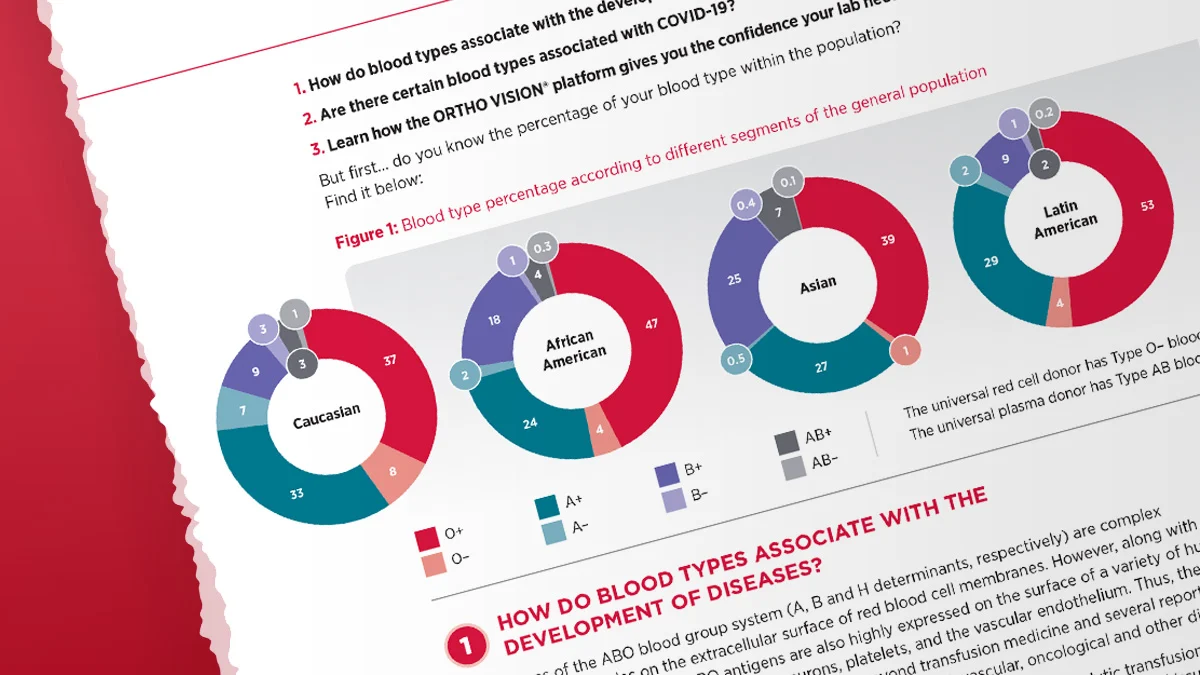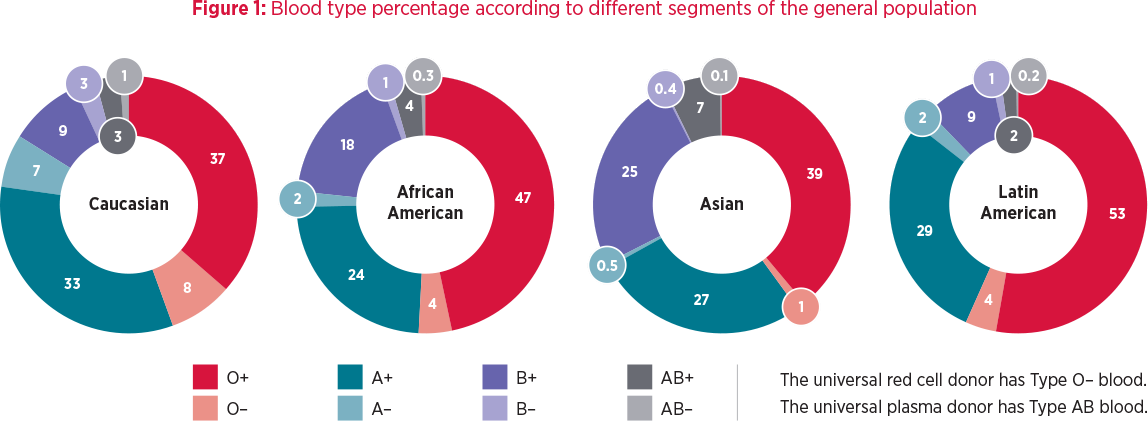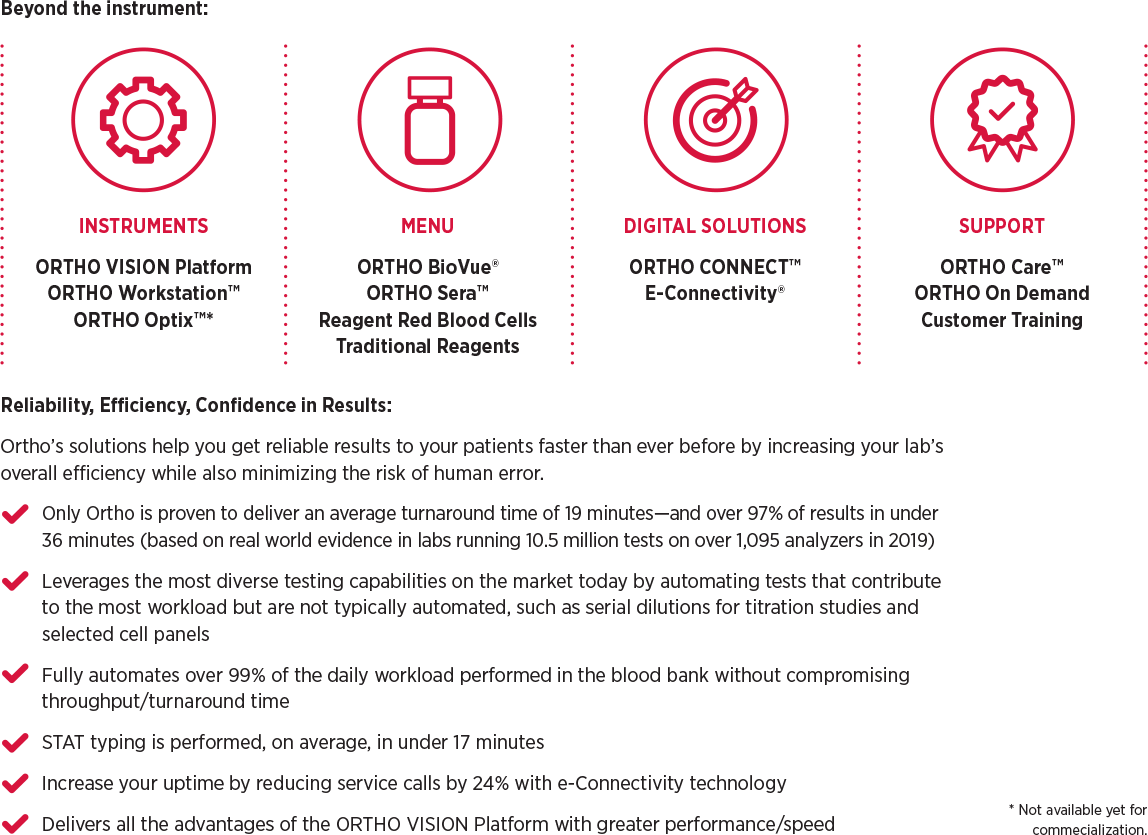
1. How do blood types associate with the development of diseases?
2. Are there certain blood types associated with COVID-19?
3. Learn how the ORTHO VISION® platform gives you the confidence your lab needs for accurate blood typing
But first… do you know the percentage of your blood type within the population?
Find it below:
1. How do blood types associate with the development of diseases?
2. Are there certain blood types associated with COVID-19?
3. Learn how the ORTHO VISION® platform gives you the confidence your lab needs for accurate blood typing
But first… do you know the percentage of your blood type within the population?
Find it below:

1. How do blood types associate with the development of diseases?
The antigens of the ABO blood group system (A, B and H determinants, respectively) are complex carbohydrate molecules on the extracellular surface of red blood cell membranes. However, along with their expression on red blood cells, ABO antigens are also highly expressed on the surface of a variety of human cells and tissues, including the epithelium, neurons, platelets, and the vascular endothelium. Thus, the clinical significance of the ABO blood group system extends beyond transfusion medicine and several reports have suggested an important involvement in the development of cardiovascular, oncological and other diseases.
There are proven relationships between ABO blood group and conditions for haemolytic transfusion reactions due to the transfusion of ABO-incompatible blood, transplantation of ABO-incompatible cells/tissues/organs, and haemolytic disease of the fetus and newborn resulting from ABO incompatibility between mother and baby.
The early statistical associations with disease that are still of interest include the relationship between infectious diseases and ABO blood type.
In 1917, the first publication on blood group and disease connected to ABO blood type with tuberculosis
Later, Mourant suggested that the major differences in the geographical distribution of ABO blood groups may be the consequence of epidemics that occurred in the past. Evolutionary selection studies on the genetic characterization of the ABO blood group in Neanderthals and ancient Egyptian mummies suggest a potential selective advantage of the O allele influencing the susceptibility to several different pathogens responsible for diseases such as severe malaria, H. pylori infections and severe forms of cholera. The positive selective pressure could have been caused by the absence of the A and B antigens (that can be used as receptors by infectious agents) and by the presence of anti-A and anti-B antibodies. In addition, certain microbial parasites share blood group antigens with their hosts (molecular mimicry).
Evidence supporting that blood group O provides a selective advantage against severe malaria has been described, the ABO system is important because the original allele, encoding glycosylation with the A sugar, acts as an adhesion ligand with infected red blood cells thus promoting rosette formation with uninfected red blood cells and adhesion to vascular endothelium, which cause vaso-occlusion and severe disease. The least rosette formation is observed in individual with blood group O, thereby explaining the prevalence of this blood group in areas in which malaria is endemic.
In 1954, Aird and colleagues identified the greater susceptibility to group O individuals to peptic ulcers.
H. pylori is now known as a causative agent leading to peptic ulceration and gastric cancer. The blood group antigen-binding adhesin (BabA) mediates the adherence of H. pylori to ABO/Lewis b (Leb ) blood group antigens in the gastric pit region of the human stomach mucosa. This interaction is important not only for the adhesion of H. pylori to the stomach surface but also to anchor the bacterial secretion system to the host cell surface so that bacterial virulence factors can be effectively injected into the cytosol of the host cell.
One of the latest examples of diseases "statistically" linked to ABO blood group is Chikungunya virus infection; although the association needs to be thoroughly re-evaluated and confirmed by large (genome-wide association) studies.
2. Are there certain blood types associated with COVID-19
A publication in Annals of Hematology by Latz et al aimed to determine if there is an association between ABO blood type and severity of COVID-19 defined by intubation or death as well as ascertain if there is variability in testing positive for COVID-19 between blood types.
In the multi-institutional study, all adult patients who tested positive for COVID-19 across five hospitals were included (from March 6th to April 16th, 2020). Hospitalization, intubation, and death were evaluated for association with blood type. During the study period, there were 7,648 patients who received COVID-19 testing throughout the institutions. Of these, 1,289 tested positive with a known blood type. Of the 1,289 patients who tested positive, 440 (34.2%) were blood type A, 201 (15.6%) were blood type B, 61 (4.7%) were blood type AB, and 587 (45.5%) were blood type O.

The analysis showed that there was no association between blood type and any of the peak inflammatory markers nor between blood type and any of the clinical outcomes of severity. After multivariable analysis, blood type was not associated with risk of intubation or death in patients with COVID-19.
Patients with blood types B and AB who received a test were more likely to test positive and blood type O was less likely to test positive. Rh+ patients were more likely to test positive.
In contrast and interestingly, the recent publication “Genomewide Association Study of Severe Covid-19 with Respiratory Failure” published on June 17th, 2020, on The New England of Journal Medicine, studied 1,980 people undergoing treatment for severe COVID-19 and respiratory failure at seven medical centers in Italy and Spain. This study suggests that part of the answer to why susceptibility may be found in the genes that each one of us carries and correspondingly carry a greater risk of COVID-19-related death.
It suggests that people with blood type A face a 50% greater risk of needing oxygen support or a ventilator. In contrast, people with blood type O appear to have about a 50 percent reduced risk of severe COVID-19.
The other association signal popped up on chromosome 9, right over the area of the genome that determines blood type. Whether you are classified as an A, B, AB, or O blood type, depends on how your genes instruct your blood cells to produce (or not produce) a certain set of proteins. The researchers did find evidence suggesting a relationship between blood type and COVID-19 risk. Nevertheless, the findings regarding blood types and what purpose they serve in the prognosis of the disease is still largely unknown, and very little is known about their links to viruses.
3. Learn how the ORTHO VISION® Platform can give you the confidence your lab needs for an accurate blood typing.
Unlocking what role blood types play would potentially help scientists better understand the risk of disease for people in different blood groups.
At Ortho Clinical Diagnostics, we understand how stressful running a lab can be, especially with today’s ever-increasing hurdles. That’s why we offer solutions designed specifically to help solve the challenges you face—particularly when it comes to managing your lab’s resources. Everything we offer is designed to help free up your staff to complete the critical tasks that require their expertise—ensuring that you can continue delivering safe transfusions for patients in need, no matter what—because every test is a life.
Ortho empowers you with tools and knowledge to better control your complex operations, optimize your valuable resources and trust in your results. An integrated solution of high quality assays, cutting edge automated processing, advanced workflow tools all held together with best in class service and support.

Click here to download a pdf of this article
Sources: https://www.redcrossblood.org/donate-blood/blood-types.html
Beyond immunohaematology: The role of the ABO blood group in human diseases,Giancarlo Maria Liumbruno & Massimo Franchini, Blood Transfus 2013; 11: 491-9, doi 10.2450/2013.0152-13.
Annals of Hematology. Blood type and outcomes in patients with COVID-19. Christopher A. Latz, Charles DeCarlo, Laura Boitano, C. Y. Maximilian Png, Rushad Patell, & Mark F. July 2020
The New England Journal of Medicine. Genomewide Association Study of Severe Covid-19 with Respiratory Failure. The Severe Covid-19 GWAS Group* Dr. Ellinghaus,Ms. Degenhardt, Drs. Valenti, Franke, Karlsen. June 17, 2020
Press contact:
For media inquiries please contact
Ortho Media Relations
Ortho Clinical Diagnostics
media@quidelortho.com
.jpg)
